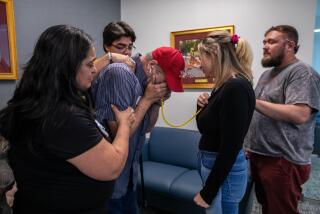Opinion: Deciding who gets a liver transplant should be based on need, not geography
- Share via
To the editor: Dr. Willscott E. Naugler rightly argues that liver redistricting intended to reduce deaths requires looking beyond geography and donation rates of local populations (noting California’s high donation rate). He states that rural centers list fewer very ill patients than their urban counterparts, who, he contends, over-list. (“California has long wait lists for liver transplants, but not for the reasons you think,” Opinion, Dec. 13)
Unfortunately, there is little published evidence of this association, and rural under-listing has been found to be due to a lack of specialty care. Meanwhile, there is substantial published work addressing the widely varying rates of liver disease, especially among Hispanics and Asians, which is substantially responsible for the regional variation in the rate of end-state liver disease at transplant.
His conclusion that not listing sicker patients will lead to “increasing health” is contradicted by his acknowledgment that the number of transplants will not change with or without redistricting and research that finds no outcome variance between centers’ listing rates. However, redistricting has been modeled to save an additional 250 lives per year.
Thomas Mone, Los Angeles
The writer is chief executive of OneLegacy, a nonprofit that facilitates organ transplants in Southern California.
..
To the editor: Properly allocating medical resources is indeed a tricky balance. There are many occasions when too few resources are available for everyone to survive.
The utilitarian ethics promoted by John Stuart Mill state that an action is right if it brings about the best outcome of the available choices. A simplistic explanation of this ethical action is that it must bring the greatest good to the most people.
Everyone agrees that all life is sacred, but how do we apply this ethic when there are not enough resources to meet the need? Hard choices must be made, which means trade-offs must be accepted. Rationing is inevitable and must be done in an ethical manner that will serve justice and save lives.
But what does that mean? It means there must be transparency about how distribution (in this case, of organs) is determined.
Richard Boudreau, MD, Marina del Rey
The writer is a bioethicist at Loyola Marymount University.
Follow the Opinion section on Twitter @latimesopinion and Facebook
More to Read
A cure for the common opinion
Get thought-provoking perspectives with our weekly newsletter.
You may occasionally receive promotional content from the Los Angeles Times.









